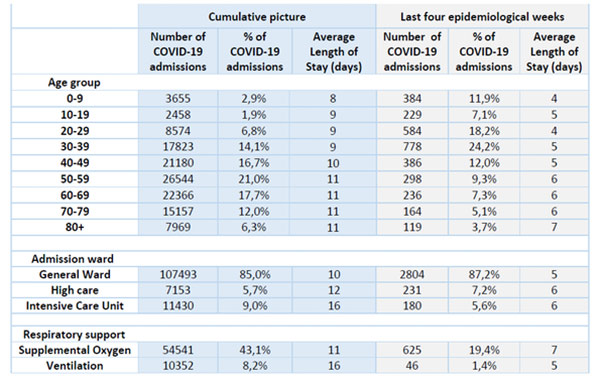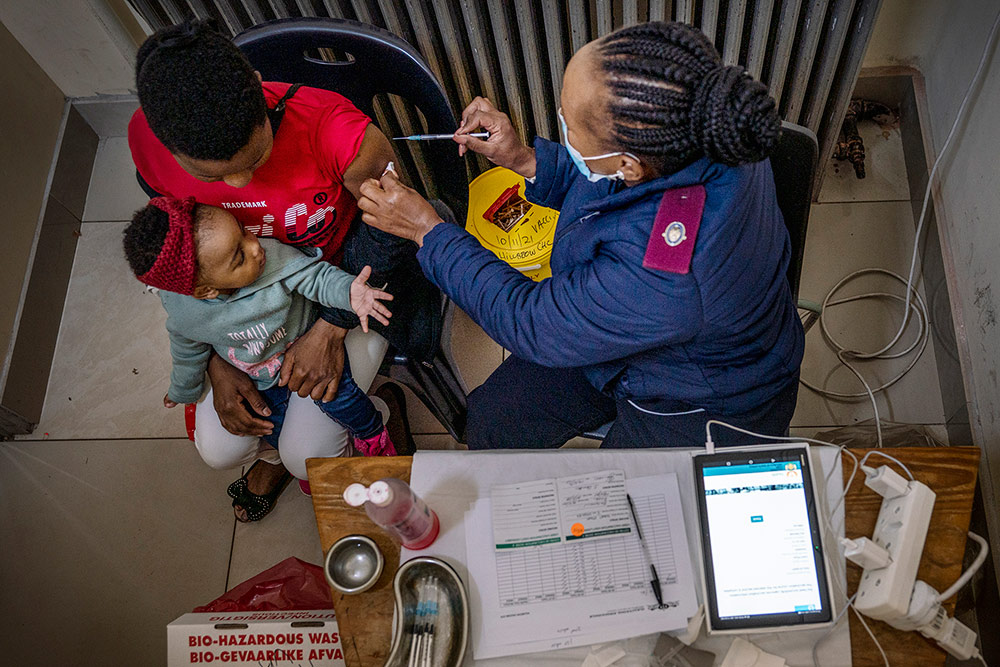[Editor’s note: Gauteng is the smallest of South Africa’s nine provinces but home to a quarter of the country’s population. It is also the country’s economic powerhouse. These factors have contributed to it becoming the epicentre of the COVID-19 epidemic. Gauteng’s COVID-19 surveillance aims to provide an understanding of the province’s experience. This also serves as an early warning system for other parts of the country. Public health medicine specialist Harsha Somaroo is part of the team analyzing data for the Gauteng Department of Health and shared her analysis of what it’s showing so far with the Conversation Africa.]
What’s your data showing about COVID-19 in Gauteng?
In the four epidemiological weeks (Nov. 13 to Dec. 4), there was an exponential rise in new COVID-19 cases. The province officially entered its fourth COVID-19 wave on Dec. 1.
During this period South African scientists announced they had identified a new variant of SARS-CoV-2, which the World Health Organization went on to label a variant of concern and named it Omicron.
Current data show that the Omicron variant is dominating new COVID-19 cases in the province.
The rate of increase in new cases in Gauteng has been significantly higher compared to any other period in the epidemic in the province. The weekly rates of increase in new infections, when compared to the previous week, were 71 per cent, 341 per cent, 379 per cent and 272 per cent.
The COVID-19 test positivity rate (the number of tests done that have a positive result) for the past four weeks, were 1.4 per cent, 5.0 per cent, 19.0 per cent and 33.9 per cent. This reveals a rapid rise, and now widespread community transmission, of SARS-CoV-2 in Gauteng.
What does your data tell us about Omicron?
The recent exponential rise in new COVID-19 cases, associated with the detection and domination of the Omicron variant in the province, suggests that this variant of concern is highly transmissible.
It is also possible to understand the severity of illness better by monitoring trends and outcomes among hospitalized patients. There are two sets of data that provide insights — hospitalizations and excess deaths. Excess deaths are deaths above the number expected in a region for that point in time, and give an indication of the COVID-19 related deaths in a region.
Compared with previous periods during which the numbers have spiked, the latest numbers show that new daily COVID-19 hospitalizations and excess deaths have been lower than the rate of increase in new COVID-19 cases, suggesting that the variant may cause less severe illness.
The weekly rates of new hospitalizations have been significantly high for the past three weeks (120 per cent, 166 per cent and 125 per cent). But this was still lower compared to previous periods in which infection numbers rose. Also, the current increase came off a very low base as admission numbers had fallen after the last COVID-19 waves in Gauteng.
Another caveat is that some patients have been admitted for other conditions, and were diagnosed with COVID-19 due to routine testing protocols in hospital, and not because they showed symptoms. Due to the number of patients for which this information is available, this proportion could lie between 7.4 per cent and 52.1 per cent of new COVID-19 admissions.
Another difference the data are showing is that there’s a change in the age profile of admissions. Younger age categories of patients (under 10, 10 to 19, and 30 to 39) accounted for higher proportions of hospital admissions during the past month than previously.
A significant proportion of these admissions might be due to asymptomatic COVID-19 infections which were incidental diagnoses due to routine testing for COVID-19 on admission to hospital (between seven per cent and 46 per cent).
The average length of stay in hospital, for all age categories of patients, was lower in the past month compared to overall. Additionally, fewer patients were admitted into ICUs (5.6 per cent versus nine per cent), and a lower proportion of patients required supplemental oxygen therapy (19.4 per cent versus 43.1 per cent) or ventilation (1.4 per cent versus 8.2 per cent) in the past four weeks compared to cumulatively.
In-hospital mortality rates were also lower in the past four weeks compared to cumulatively (2.6 per cent compared to 22 per cent).
However, there was still higher mortality among those over 50.
The early findings suggest less severe COVID-19 infections, though they should be correlated with clinical pictures and monitored closely over the next few weeks to better understand the clinical manifestations and outcomes related to the Omicron variant.

What do people need to do in the light of this information?
These early surveillance findings give us some idea of the transmission dynamics and virulence of the Omicron variant in Gauteng. Trends will need to be monitored closely over the next few weeks to fully understand the impact of this new variant.
The recent high rates of COVID-19 transmission and continued higher death rates among older patients hospitalized with COVID-19, have important implications for public health measures. The following are critical to decrease the number of new COVID-19 cases:
- physical distancing;
- avoidance of gatherings and poorly ventilated spaces;
- wearing of masks at all times when around other people; and
- ensuring good hand and respiratory hygiene.
All eligible people, especially those over 50, should be fully vaccinated against COVID-19, to protect themselves against severe illness and death. They should also avail themselves of booster shots where indicated.![]()
![]()
Read more: Coronavirus

















Tyee Commenting Guidelines
Comments that violate guidelines risk being deleted, and violations may result in a temporary or permanent user ban. Maintain the spirit of good conversation to stay in the discussion.
*Please note The Tyee is not a forum for spreading misinformation about COVID-19, denying its existence or minimizing its risk to public health.
Do:
Do not: